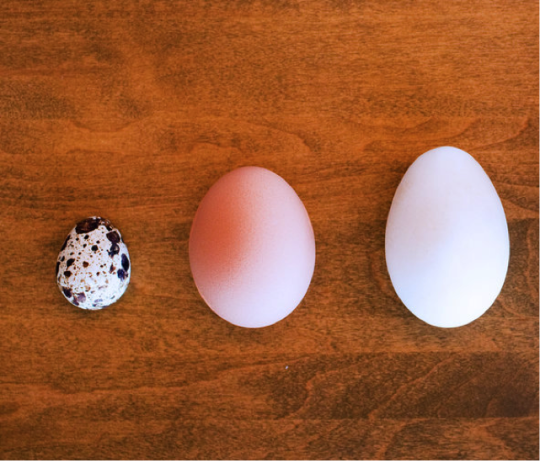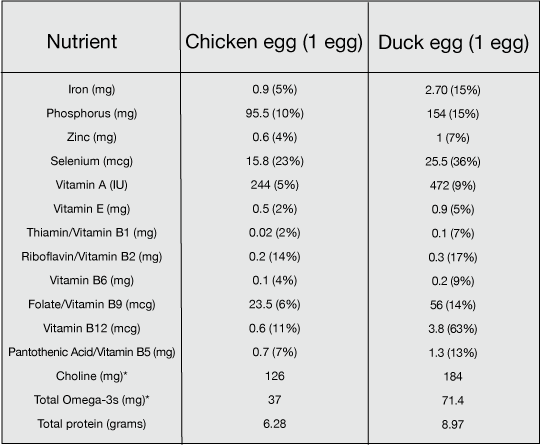
Which Egg Is Right for You?
- Nutrition in all sizes
- Brown or white: putting the shell color myth to rest
- Are you skipping the most nutritious part of the egg? Find out…
Dear Reader,
Ahh, Easter time.
A time when chocolate bunnies, marshmallow chicks, jellybeans, and colored eggs invade the homes of many Americans.
But during this time of confectionary animals and sugar-loaded snacks, eggs (of bird origin, not the crème-filled type) maybe the only healthy food in sight this weekend.
And while all eggs are of high nutritional value, there are some differences among the bird varieties.
Today, just in time for Easter and the beginning of spring, Living Well Daily will breakdown the nutritional benefits of different types of eggs.
Let’s get started:
![]() Quail Eggs
Quail Eggs
Because of their pleasant taste and bite-sizedness, quail eggs are becoming more and more popular. Quail eggs are found on the menus of all types of restaurants, from high-end gourmet to your local sushi joint.
Possibly the tiniest in size of commonly eaten eggs, these little shelled gems still pack a powerful nutritional punch at fraction of the calories (just 14) of other eggs. And like other types of eggs, quail eggs are full of amino acids, vitamins, and minerals. However, you may have to eat a few more to get a high dose of these, as they weigh only 0.3 ounces and have just 1.2 g of protein each.
Quail eggs also have more cholesterol than most eggs due to their yolk-to-white ratio. A serving of five quail eggs has about 380 milligrams.
![]() Chicken Eggs
Chicken Eggs
Chicken eggs are a refrigerator staple for most of us and a likely addition to a dessert recipe or the star of our breakfasts. But how much nutrition are really getting from the common chicken egg?
Turns out, a lot.
Chicken eggs are chock-full of zinc, potassium, and phosphorus. In addition, chicken eggs supply you with calcium and lots of vitamins, including Vitamin A, E, B1, B2, and D. In fact, chicken eggs are one of only a few foods considered to be a good source of vitamin D.
In addition, one chicken egg contains about 65 calories and 14 percent of your daily allowance for protein, as well as the eight basic amino acids your body needs to be healthy.
Though there is some controversy over which color chicken egg is more nutritious, there is no nutritional difference in the colors.
Nutritional value depends on other factors, which will get to in a bit.
A quail egg, chicken egg, and duck egg. Photo credit: NPR. org
![]() Duck Eggs
Duck Eggs
While duck eggs were once at the top of the roost for many cultures, chicken eggs have all but replaced them.
One reason for this is salmonella. Duck egg shells are more porous than those of chicken eggs, which increases the chance of infection. However, duck eggs are perfectly safe for consumption as long as they are stored in a sanitary environment.
In some circles, duck eggs are considered the “Cadillac” of eggs when it comes to nutrition. Check out this chart below to see the nutritional differences between chicken eggs and duck eggs:
Table from paleoleap.com
Keep in mind that one reason for its increased nutrients is because of its size — duck eggs are about 30% larger than chicken eggs and 130 calories each.2
![]() Hatch Your Plan
Hatch Your Plan
As you can see, all three eggs have something different to offer nutritionally. It’s up to you to make choose which one best meets your nutritional needs and is available in your area.
Chicken eggs aren’t hard to come by. However, you may have to visit a specialty store or farm stand to find quail and duck eggs.
Whichever egg you choose, be sure you’re buying free-range and organic eggs for optimal nutrition. This ensures the laying birds have access to the outdoors, where they can peck for insects and grubs, and access to organic supplemental feed free of pesticides, herbicides, and GMOs.3
And when you go to eat them, don’t skip the yolks. Yolk, of all varieties are a good source of micronutrients and omega-3s. Egg whites on the other hand, are just empty proteins with little added nutritional value.

Natalie Moore
Managing editor, Living Well Daily
Sources
[1] Different Types of Eggs and Their Nutritional Value
[3] Best Eggs: Organic, Free-Range, or Conventional?
Written By Natalie Moore
Natalie Moore is a dedicated health researcher with a passion for finding healthy, natural, and science-based solutions. After a decade of direct healthcare experience in western and natural medicine, she was involved in public health research before joining Living Well Daily.
View More Free Articles
Do THIS Every 20 Minutes to STOP Digital Eye Strain
Our eyes are under assault—they are the true victims of our current digital age. And it’s because we are constantly glued to screens… phones, tablets, computers, TVs—you name it. Unfortunately, that screen time is taking a serious toll. Digital eye strain affects millions worldwide. In fact, up to 50 percent of computer users could develop...
Mailbag: The Calcium Mistake That's Hardening Your Arteries
“What type of calcium is best to take with bisphosphonates for osteoporosis? I know some varieties can build up in arteries. Thanks for the help.” —Bone Builder Hi Builder, When a patient asks me about calcium, I ask them a peculiar question in return… “Ever wonder how elephants and giraffes build and maintain their massive...
Doctor-Approved Method to Ditch Blood Pressure Meds
In a world where drug solutions dominate healthcare, it’s refreshing to discover that best remedies sometimes don’t involve a single pill. A groundbreaking study shows simple relaxation techniques could be your secret weapon against one of America’s deadliest health conditions. Best of all? It’s free, easy to start right away—and your results are bound to...
Trouble Hearing? Your Heart Could Be at Risk
With research exploding and data pouring in, scientists are uncovering some weird (and surprisingly helpful) health connections. Today’s odd couple? Hearing loss and heart failure. Turns out your ears and your ticker are more connected than you ever imagined. A major study published in the journal Heart looked at over 164,000 people for nearly a...
Stay Up Late? It Could Destroy Your Mental Health
If you dread mornings but come alive at night, there’s concerning new research you need to know about. A recent study found that “night owls” are at higher risk for depression. But before you rush to set your alarm to get up with the sun tomorrow, there’s more to the story… Chronotypes are essentially your...
Go from Flabby to Fit with this Common Vitamin
If you’re like many of us, you woke up one day, looked in the mirror, and realized you’re no spring chicken anymore. Even worse—when you weren’t paying attention—it seems you somehow misplaced the muscles of your youth and have gone from fit to flabby. Aging has a way of humbling us like that. But scientists...
Seasonal Allergy “Off Switch” Discovered in the GUT
“Doc, why am I suddenly suffering from seasonal allergies when I’ve never had them before?” It’s a question I get all the time—and my answer might surprise you. Stop looking up at the trees—and start looking down at your gut… Your sneezing fits, itchy eyes, and runny nose might have more to do with what’s...
“Canary in the Coal Mine” Test Sniffs Out Brain Issues Early
One of the most common questions I get is how to tell if you’re starting to experience cognitive decline. I get it—losing your memory is scary, especially when it sneaks up on you. But here’s some exciting news that might put your mind at ease. A fascinating new study suggests that your nose might be...
BEAT Stubborn Leg Swelling Without Dangerous Diuretics
“I need help with edema.” —Swollen Hi Swollen, When patients complain of edema—fluid retention that causes feet, ankles, and legs to swell—I explain that, while conventional medicine immediately prescribes diuretic drugs, nature offers us effective solutions we can try first. I’ll share those in just a moment, but first, let’s take a quick look at...
Mental Health Linked to 30% FASTER Aging [6-Step FIX]
Your mind and body are more connected than you might realize—and a groundbreaking new study proves just how profound that connection really is. In fact, it’s this mind-body link that helps explain why battling depression can put you on the fast track to physical decline. Depression is the most common mental health condition worldwide. We’ve...











